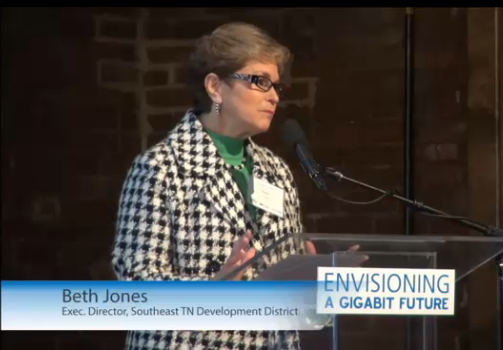Bring essential Internet to rural communities, officials say

By Chris Butler | Tennessee Watchdog
CHATTANOOGA, Tenn. — The Internet is as essential to life as food and water, and it’s not fair that some people have it while others don’t.
No, these are not the ramblings of a spoiled teenager, but rather the main talking points at a gathering of government officials and civic leaders in Chattanooga this week to discuss broadband access.
Chattanooga’s Electric Power Board President Harold DePriest was among the many speakers.
JONES: Beth Jones, director of the Southeast Tennessee Development District, speaks at an event in Chattanooga this week.
EPB competes in the city with private providers such as Comcast. The public utility offers ultra high-speed Internet through a smart grid, which taxpayers paid $111 million for, via federal stimulus money.
Of all the statements about the need for greater broadband access, none Tuesday was seemingly as dramatic as those of Beth Jones, director of the Southeast Tennessee Development District.
“There are the haves and the have-nots. In order to successfully compete throughout the global economy, it is about equity, having access,” Jones said, adding rural areas without Internet have lower incomes, fewer jobs and lower educational attainment.
“It’s like sitting along the Tennessee River and seeing water and not being able to have it.”
Jones even spoke of a widow in a rural area who’s unable to sell her house because broadband access is unavailable.
Chattanooga Mayor Andy Burke, meanwhile, stressed similar talking points about municipal Internet services, as did Debra Socia of the nonprofit Next Century Cities.
“Here in this city you can see what happens when the economy is energized. The community is engaged. The learning is elevated, and the opportunities abound,” Socia said.
State Sen. Janice Bowling, R-Tullahoma, discusses her failed legislation that would have allowed EPB to expand into rural counties.
But despite positive platitudes, Socia was short on specifics on how, exactly, EPB has enriched Chattanooga in terms of new jobs or helped the city become a hub for techies, as was promised three years ago.
Bowling, meanwhile, described LightTube, a similar Internet service in her home city, under the auspices of the public Tullahoma Utilities Board.
Like Socia, Bowling also seemingly didn’t provide specifics on how it has helped.
“Contrary to what people say, this isn’t tax dollars competing with private business. This is public dollars, the people themselves making an investment that is owned by the consumer,” Bowling told the crowd, adding 20th century technology is holding small, rural areas “hostage.”
“As a community of 18,000 we have grown with our jobs at twice the rate of other communities our size in the state of Tennessee over the last year, good jobs, good-paying jobs. We are providing things that would not be available to our town.”
In previous fiscal years the deficit was $2.1 million and, before that, $1.6 million.

EPB Harold DePriest discusses the virtues of government-owned Internet at an event in Chattanooga Tuesday.
When Tennessee Watchdog last checked, the Gigabit service only had one customer.
Only about one-third of Tullahoma’s residents use LightTUBe, while the remainder use private competitors, City Administrator Jody Baltz has said.
TUB General Manager Brian Skelton, who in the past has refused to answer any of our questions, told the Tullahoma News he and other city officials aren’t motivated by profit.
“We’re not in this to make money. That’s the difference between us and privately owned telecommunications companies,” Skelton said.
Contact Christopher Butler at chris@tennesseewatchdog.org
Follow Tennessee Watchdog and receive regular updates through Facebook and Twitter
Like Watchdog.org? Click HERE to get breaking news alerts in YOUR state!







